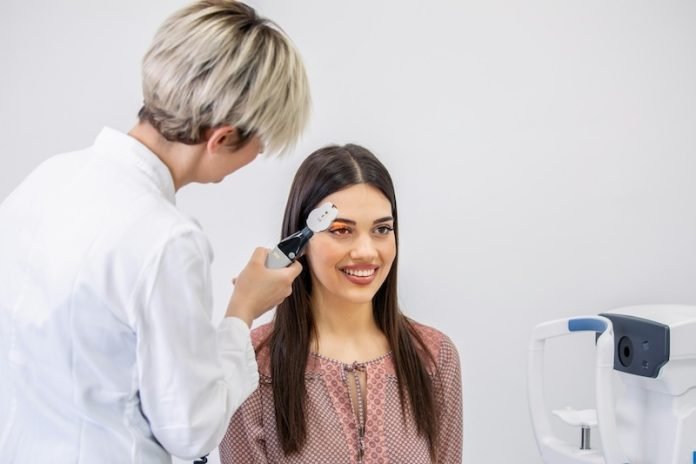
When we think about eye tests, we usually associate them with checking our vision or getting a prescription for glasses.
But what if these tests could tell us much more about our overall health? Remarkably, recent research has revealed that routine eye examinations might hold the key to early detection of chronic conditions such as diabetes, multiple sclerosis (MS), and dementia.
This insight offers a fascinating glimpse into the future of medical diagnostics, where a simple eye check-up could be a vital tool in our healthcare arsenal.
The eye is the only place in the body where doctors can directly observe blood vessels and nerves without any invasive procedures.
This unique aspect makes eye exams incredibly valuable for spotting early signs of systemic diseases—conditions that affect the entire body rather than a single organ or part.
Starting with diabetes, the link between eye health and this widespread condition is well-established. Diabetes can lead to diabetic retinopathy, a complication that affects the blood vessels of the retina at the back of the eye.
Early stages might not cause symptoms, but an eye test can detect signs like bleeding or swelling in the retina. Identifying diabetic retinopathy through an eye exam can prompt further glucose testing, allowing for early diabetes diagnosis and management before more serious complications develop.
Moving to multiple sclerosis (MS), a disease that impacts the central nervous system, its early detection can be challenging due to the variability in symptoms.
However, optic neuritis — inflammation of the optic nerve that can lead to pain and temporary vision loss — is often one of the first signs of MS.
An eye doctor might notice abnormalities in the appearance of the optic nerve and the way the eye responds to visual stimuli, which can lead to further neurological evaluation and quicker diagnosis.
Dementia, particularly Alzheimer’s disease, is another condition that might leave its mark on the eye. Researchers have found that certain changes in the retina and optic nerve could reflect the early stages of dementia.
For example, thinning of the retina and the presence of certain proteins in the eye could correlate with brain changes seen in Alzheimer’s.
These findings are groundbreaking because they offer a non-invasive way to screen for dementia, potentially leading to earlier intervention and better management of the condition.
It’s important to note that while these connections between eye health and systemic diseases are promising, eye tests alone cannot diagnose diabetes, MS, or dementia.
Instead, they serve as a critical early warning system. Detecting signs of these conditions through an eye exam can trigger a cascade of further testing and evaluation, facilitating early diagnosis and treatment.
Moreover, the research into using eye exams as diagnostic tools is still evolving. Scientists and doctors are continuously working to understand the full potential of eye tests in predicting and diagnosing systemic diseases.
As this field of study expands, we may soon see eye exams becoming a routine part of screenings for various conditions, changing the way we approach disease detection and prevention.
In conclusion, the idea that eye tests could help detect serious conditions like diabetes, MS, and dementia is a testament to the incredible complexity and interconnectedness of the human body.
As research progresses, leveraging the power of routine eye exams could transform them from mere assessments of visual acuity to comprehensive health evaluations, offering a clearer picture of our overall well-being.
For more information about dementia, please see recent studies about brain food: nourishing your mind to outsmart dementia and results showing that re-evaluating the role of diet in dementia risk.
For more information about brain health, please see recent studies about the power of healthy fats for brain health and results showing that Mediterranean diet may preserve brain volume in older adults.
Copyright © 2024 Knowridge Science Report. All rights reserved.



